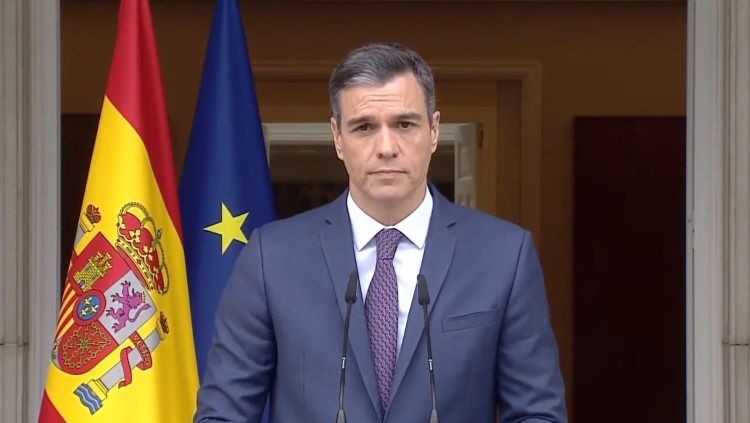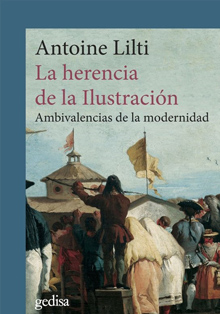The Diplomat
The President of the Government, Pedro Sánchez, has announced that he is canceling his public agenda for a few days to “reflect” on whether or not he will continue to lead the Executive, following the investigations into his wife, Begoña Gómez.
On his social network account X, Sánchez published a letter addressed to citizens in which he stated: “I need to stop and reflect. I urgently need to answer the question of whether it is worth it, despite the mire in which the right and the extreme right they intend to convert politics. Whether I should continue at the head of the Government or resign from this high honor.”
In that letter, written after it became known that a judge has decided to investigate his wife for influence peddling, following the presentation of a complaint by the ‘Manos Cleans’ union, Sánchez announces that next Monday, the 29th, he will appear before the media to make his decision known.
The President of the Government writes in the letter that “despite the caricature that the political right and extreme right” have made of him, he has “never” been “attached to the position.” And he adds: “I do have it in duty, in political commitment and in public service. I don’t go through positions, I assert the legitimacy of those high responsibilities to transform and advance the country that I love.”
Sánchez charges in the letter against the PP and Vox, pointing out that “the right and extreme right did not accept the electoral result” of 23J. And he considers that “now they have crossed the line of respect for the family life of a President of the Government and the attack on his personal life.”
On several occasions in his letter, the chief executive attacks the media that have published information about Begoña Gómez’s alleged contacts with businessmen who received public money, specifically El Confidencial and Esdiario, whom he describes as ‘with a marked right-wing and ultra-right-wing orientation’.
Likewise, in his letter he expressly cites the leaders of the PP, Alberto Núñez Feijóo, and of VOX, Santiago Abascal, whom he accuses of starting up ‘the mud machine’ and of ‘trying to dehumanise and delegitimise the political adversary through allegations that are as scandalous as they are false’.
He also indicates that ‘both are necessary collaborators together with an ultra-right-wing digital galaxy and the organisation Manos Limpias. In fact, it was Mr. Feijóo who denounced the case before the Conflict of Interests Office, asking for 5 to 10 years of disqualification from public office for me’.
‘Then, using their conservative majority in the Senate, they set up a commission of enquiry to, as they say, clarify the facts related to this matter. Of course, what was missing was the judicialisation of the case. This is the step they have just taken”, adds Sánchez, who assures that Begoña Gómez “will defend her honour” and “will collaborate with the justice system”.
Sánchez also affirms: ‘At this point, the question I legitimately ask is, is all this worth it? I honestly don’t know. This attack is so serious and crude that I need to stop and reflect with my wife”, with whom he claims to be “deeply in love”, while saying that he “lives with impotence in the mud that they spread over her day in and day out”.
Pedro Sánchez’s announcement yesterday afternoon provoked a major political earthquake and speculation about what might happen in the future.
The PSOE came out en bloc to support the President of the Government, and its spokesperson, Esther Peña, wrote on social networks: ‘Lies hurt, but they never win. Your determination and nobility will win once again. Always on your team president’. And the spokesperson of the Socialist Parliamentary Group, Patxi López, said that Sánchez ‘represents the dignity and courage that is needed in the face of an immoral right wing that is willing to do anything’. Likewise, most PSOE ministers and leaders gave him their support.
Around half a hundred PSOE supporters demonstrated late yesterday afternoon outside the national socialist headquarters in Calle Ferraz in Madrid, carrying party flags, to express their support for Sánchez.
Second vice-president and leader of Sumar, Yolanda Díaz expressed her ‘support and respect’ for Sánchez’s decision and added that ‘the offensive of the ultra-right cannot get its way’ and that it is time to ‘defend democracy, the progressive bloc and the legitimacy of the coalition government that has improved the lives of the people’ of the country.
Sánchez’s former partners also reacted to the letter. Thus, the leader of Podemos, Ione Belarra, showed her ‘solidarity and empathy’ with the head of the Executive, but told him that they should have stopped the practice of judicial war and ‘media persecution’ when they ‘harassed’ the former vice-president Pablo Iglesias. He also took the opportunity to say that ‘the democratisation of the judiciary and the media is a democratic urgency’.
The former president of the Generalitat and Junts+ candidate for the Catalan elections, Carles Puigdemont, said that if this period of reflection ‘is not a tactical move’ and Sánchez believes that his leadership has been weakened by the Spanish right-wing campaign, ‘he can always present a question of confidence and clear up all doubts’.
The PP and Vox criticised the chief executive’s letter. The president of the PP, Alberto Núñez Feijóo accused Sánchez of ‘victimising’ himself and ‘polarising’ society in order to ‘activate his electorate’ ahead of the Catalan and European elections. -I have never seen this in my life,’ he said in an interview on Onda Cero, adding that it is “a mechanism unbecoming of a mature person”.
PP secretary general Cuca Gamarra said that Sánchez ‘instead of disappearing for five days’, should ‘appear urgently to give a reasoned explanation of the scandals surrounding his party, his government and his partner’, Begoña Gómez. We denounce,’ he added, “that the President of the Government is betting on victimisation and pity instead of accountability and clarity”.
The leader of Vox, Santiago Abascal, pointed out that he does not know whether Sánchez is withdrawing to ‘prepare his legal defence’ or whether it is ‘another of his propaganda manoeuvres to present himself as a poor victim’ and thus ‘silence the majority indignation of Spaniards’.
What could happen if Sánchez resigns?
In the event of taking the decision to leave the government, Pedro Sánchez would not have the option of dissolving the Cortes before 30 May, because a year has to pass since the previous dissolution, and that took place on 30 May 2023.
What he could do is submit to a question of confidence, for which he does not need an absolute majority.
A decision to hand over the presidency to another member of his government would require a whole new investiture process to be set in motion.
The Spanish Constitution establishes a clear process to be followed in the event that the prime minister resigns. Specifically, article 101 states: ‘The Government ceases to be in office after the holding of general elections, in the cases of loss of parliamentary confidence provided for in the Constitution, or due to the resignation or death of its president’.
In other words, if Sánchez resigns, the entire government ceases to exist and the process of appointing a new president is set in motion. Then, the King, after consulting the representatives designated by the political groups with parliamentary representation and through the president of Congress, will propose a candidate for the presidency of the Government.
The candidate could be the current First Vice-President of the Government, María Jesús Montero, who is also Minister of Finance, and if she wins the support of the Congress of Deputies, she would become the first woman to head an executive in Spain. To do so, she needs to obtain an absolute majority of the votes in the first ballot or a simple majority in a second ballot to be held 48 hours after the first. If the candidate fails to be sworn in, a period of two months begins during which new candidates can be proposed. If after these two months no candidate has been invested, the King will dissolve both chambers and call new general elections.
While the appointment and investiture of the new president takes place, the current government would continue in office. With the first vice-president at the helm, it would carry out its usual tasks, managing the ordinary administration of the State, but with certain limitations in its capacities, since, for example, it would not be able to approve new bills or make legislative proposals.






